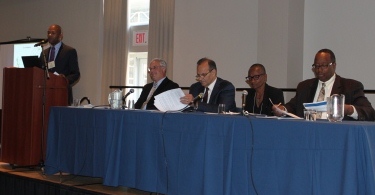NNHVIP Conference at Drexel Looks at the Impact of Trauma on Victims
At the two-day National Network of Hospital-Based Violence Intervention Programs (NNHVIP) conference hosted by Drexel University, the tone was passionate and the focus firmly on addressing trauma and its impact on victims’ recovery and progress.
NNHVIP, which currently has about 20 participating members, is headquartered in Philadelphia as a partnership between Drexel University, the Children’s Hospital of Philadelphia (CHOP) and the University of Pennsylvania. This year’s conference was held at Drexel’s Creese Student Center and was attended by such individuals as physicians, nurses, hospital administrators, social workers, lawyers, nonprofit leaders, policy makers, researchers, and funders.
On the first morning, after brief introductory remarks by Dr. Ted Corbin, medical director of the Healing Hurt People Program and director of the Drexel University School of Public Health’s (DUSPH) MD/MPH program, and Dr. John Rich, DUSPH professor and director of the school’s Center for Nonviolence and Social Justice, the conference’s keynote speaker Constance Rice took the stage.
“There are no civil rights without the first one—safety,” said Rice, a lawyer and co-director of the Advancement Project, a multi-racial civil rights organization. She went on to speak about her own experiences as a civil rights attorney, her efforts to end police abuse in Los Angeles, and her work on reducing Los Angeles gang violence.
Different workshops also took place between speakers on various topics including trauma-informed care, workforce development, and research and policy.
A lunchtime panel featured Maiken Scott, WHYY Behavioral Health Reporter as moderator of a discussion with community interventionists and their clients (pictured, right) about what works and what doesn’t when it comes to recovering from trauma.
One of the panelists, Roy Martin, Senior Youth Development Specialist for the Boston Public Health Commission pointed out the importance of seeing clients as people and not inventory.
“Deal with clients like family—what would you do for your brother, your sister, your mom or your dad?” he said.
Tony Thompson, fellow panelist and a Community Interventionist from Healing Hurt People, agreed. “It’s a people thing; you need to be real, listen, and build a connection,” he said.
 The afternoon roster of speakers (pictured, left) included baseball great Joe Torre, co-chair of the Joe Torre Safe at Home foundation and co-chair of the Defending Childhood Taskforce. He spoke on a panel with Robert Listenbee, Jr., Defending Childhood Taskforce co-chair and Chief of the Juvenile Unit of the Defender Association of Philadelphia, and Dr. Thea James, Defending Childhood Taskforce member and director of the Boston Medical Center Massachusetts Violence Intervention Advocacy Program.
The afternoon roster of speakers (pictured, left) included baseball great Joe Torre, co-chair of the Joe Torre Safe at Home foundation and co-chair of the Defending Childhood Taskforce. He spoke on a panel with Robert Listenbee, Jr., Defending Childhood Taskforce co-chair and Chief of the Juvenile Unit of the Defender Association of Philadelphia, and Dr. Thea James, Defending Childhood Taskforce member and director of the Boston Medical Center Massachusetts Violence Intervention Advocacy Program.
Second day speakers included Dr. Robert Ross, President and CEO of The California Endowment, who talked about how narrative and storytelling can be healing, especially when merged with activism, and Dr. Don Schwarz, Philadelphia Health Commissioner & Deputy Mayor for Health and Opportunity, who noted that assaultive violence disproportionately affects young black men in Philadelphia.
The goals of the conference were to:
-
Provide a forum to bring together hospital and community-based healthcare and service providers, policy makers, and researchers with a vested interest in developing and strengthening hospital-based violence intervention programs.
-
Offer a platform for invited Keynote and Plenary Session speakers who have a vested interest in violence prevention and intervention and have advocated for increased recognition of this vulnerable population and improved access to services.
-
Focus on strategies to address the psychological trauma of violence which often goes unaddressed in health care settings. This trauma may impede the recovery processes and can increase risk for both re-injury and retaliation.
-
Provide information, feedback and national visibility for a trauma-informed approach that addresses the needs of victims of violence, particularly young males of color.
-
Provide a venue for collectively identifying, prioritizing and discussing the trauma-related service barriers affecting youth victims of violence, particularly young males of color.
-
Offer workshops facilitated by the Network’s Research, Policy, and Workforce Development Workgroups, which will meet the needs of both program administrators and frontline staff.
The Center for Nonviolence and Social Justice is committed to promoting health, nonviolence and social justice through trauma-informed practice, research, professional development, and advocacy for policy change.
Healing Hurt People is the cornerstone program of the Center. It is a community-focused, hospital-based program designed to reduce reinjury and retaliation among youth ages 8-30. The program is affiliated with the Emergency Department at Hahnemann University Hospital, the Drexel University College of Medicine, and St. Christopher's Hospital for Children.